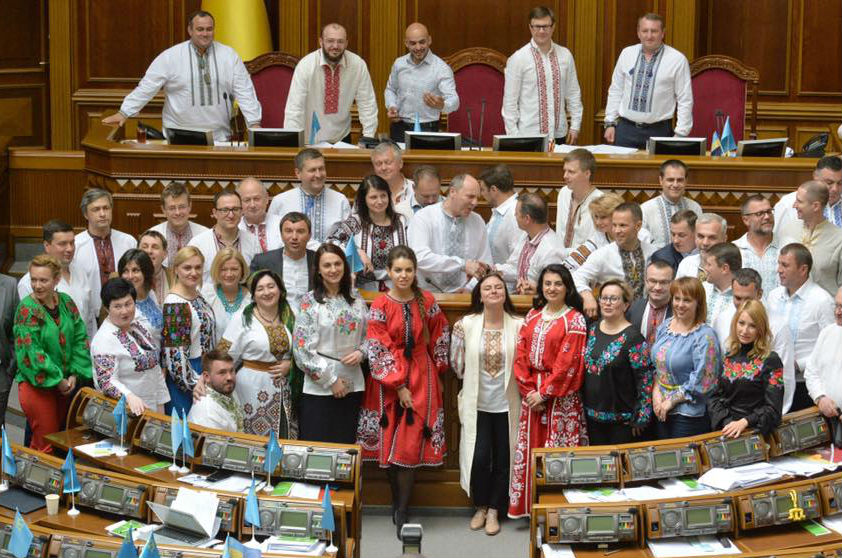 Western reports about Ukraine are inevitably laden with doom and gloom comments mentioning “stagnation,” “a crisis in reforms,” and even “counterrevolution.” Meanwhile, concerns are circulating that the United States and Europe have reached another cycle of Ukraine fatigue. But while Ukraine still has many reforms to undertake, this should not blind observers to the real progress that the country has made since 2014.
Western reports about Ukraine are inevitably laden with doom and gloom comments mentioning “stagnation,” “a crisis in reforms,” and even “counterrevolution.” Meanwhile, concerns are circulating that the United States and Europe have reached another cycle of Ukraine fatigue. But while Ukraine still has many reforms to undertake, this should not blind observers to the real progress that the country has made since 2014.
In no other period of Ukrainian history since the disintegration of the USSR have so many reforms been undertaken in such a short period of time. The country’s governments since the Euromaidan have transformed the bankrupt nation they inherited into one where Europeanization is driving profound structural changes.
There are five key reasons why reform is not in crisis in Ukraine.
First, Ukraine’s government is controlled by parliament—not, as is often wrongly assumed, by the president. Reforms are dependent upon President Petro Poroshenko, parliament, and government working together, each sharing responsibility for their progress. Contrast today’s situation to the five years of incessant squabbling that followed the Orange Revolution in which few reforms were undertaken.
As shown by the comparative experiences of twenty-seven post-communist states, democratic reforms tend to be far more successful in parliamentary systems like the ones that dominate Eastern Europe. Russia’s three neighbors who desire to join Europe—Ukraine, Georgia, and Moldova—are all parliamentary systems. Russia and the remaining countries of Eurasia, meanwhile, are presidential kleptocracies.
Second, Ukraine has established a number of crucial institutions in the fight against corruption and consolidation of the rule of law. Corruption in government contracts and the energy sector, always high, has been dramatically reduced after the introduction of the online procurement system Prozorro and other important reforms. The state gas company Naftogaz, which was traditionally a cash cow for presidents that ate up four percent of GDP in subsidies, is now the biggest contributor to the state budget, thanks to major reforms and new leadership.
Third, a major decentralization program was begun four years ago and has been successful in transferring power to local consolidated communities throughout Ukraine. With that new power has come a major growth in local financial resources that are being used to improve the lives of individual communities. USAID’s decentralization program is one of the agency’s biggest in Ukraine.
Fourth, Ukraine has taken strides in gender equality. The proportion of women in the Ukrainian parliament doubled to twelve percent after the 2014 elections, only seven percent fewer than in the US Congress. Gender issues, as gender expert Olena Suslova recently told me, have moved from the margins to the mainstream of political life. The Equal Opportunities Caucus, supported by the National Democratic Institute (NDI), which brings together fifty-three female and male MPs from six different political parties, held Ukraine’s first National Women’s Conference in November last year.
Changed public attitudes about women’s participation in politics is reflected in a recent NDI poll, indicating that nearly half of all Ukrainians believe there are insufficient numbers of women in parliament and at local government levels. Political parties that introduce gender quotas in next year’s elections will gain votes.
Fifth, Ukraine has dramatically improved its security forces. Today, it has the best army it has ever had, equipped with new domestically-produced weaponry and, starting this year, provided with US military assistance. This is critical, as only Ukraine’s army stands in the way of Russia’s threat to NATO’s eastern flank. Additionally, the Interior Ministry’s militia has been transformed into a police force, and its internal troops into a national guard.
There are other recent changes that also illustrate Ukraine’s “glass half full” story. Vox Ukraine’s survey of reforms in Ukraine since 2014 points to progress in cleaning up the banking sector, reforming the National Bank, and improving the business environment. And education and health care reform, the latter headed by Ukrainian-American Acting Health Minister Dr. Ulana Suprun, have both moved forward.
Nevertheless, several important reforms are slow or have yet to take place—such as steps to create an Anti-Corruption Court, reforms to the judiciary, privatization, and the creation of a land market. These are important areas for Ukraine to pursue this year.
Constructive criticism is always important in order to keep governments on their toes. Nevertheless, the four years since the Euromaidan revolution have been used constructively to lay the groundwork for Ukraine’s path to Europe. The revolution energized civil society, and Russian President Vladimir Putin’s military aggression radically changed public sympathies by turning Ukrainian society away from Russia—at a time when the EU is finally becoming serious about supporting Ukraine’s integration into Europe.
Taras Kuzio is a non-resident fellow at the Center for Transatlantic Relations at Johns Hopkins-SAIS, and is the author of “Putin’s War Against Ukraine” and joint author of “The Sources of Russia’s Great Power Politics: Ukraine and the Challenge to the European Order.”
Image: Parliamentarians pose on May 18, 2017, for National Vyshyvanka Day. The proportion of women in the Ukrainian parliament doubled to twelve percent in 2014. Credit: Iryna Gerashchenko Facebook Page
